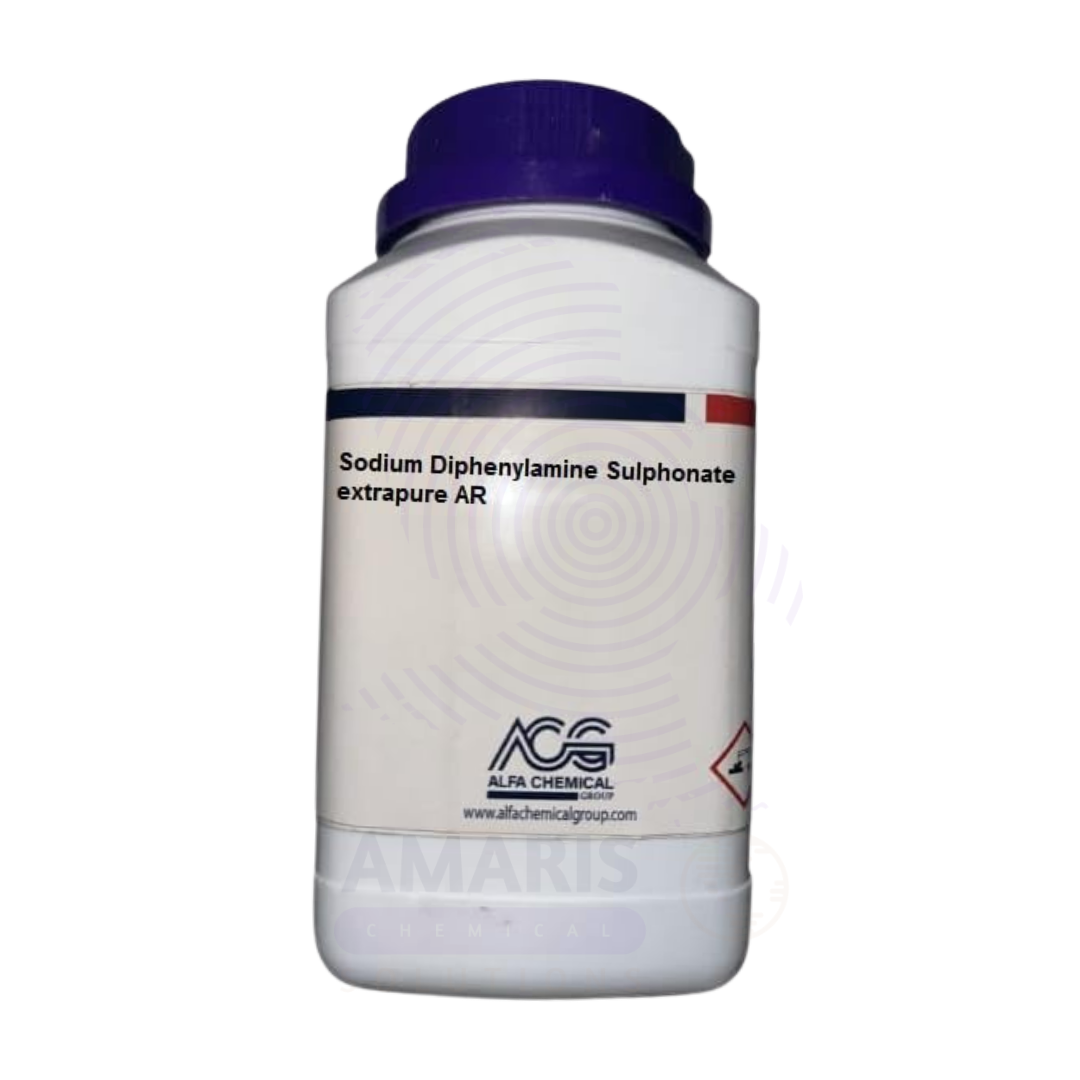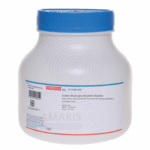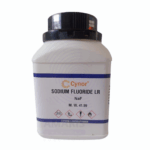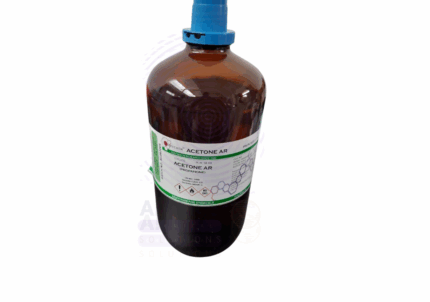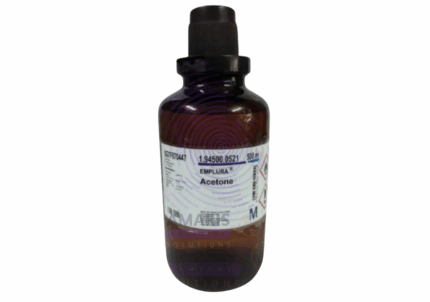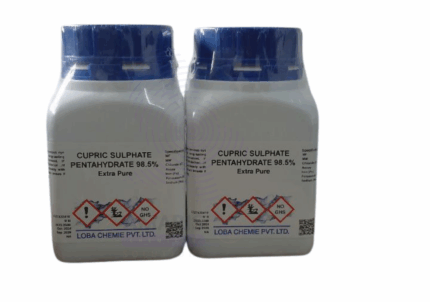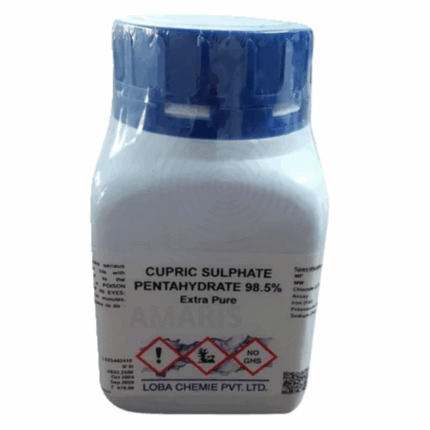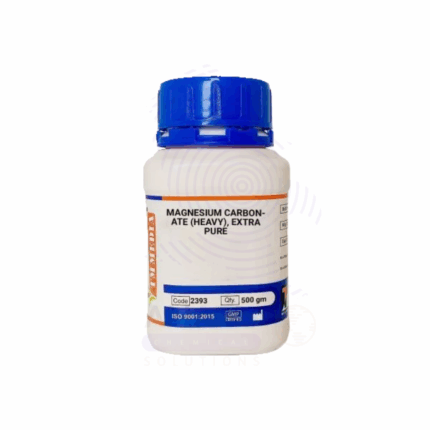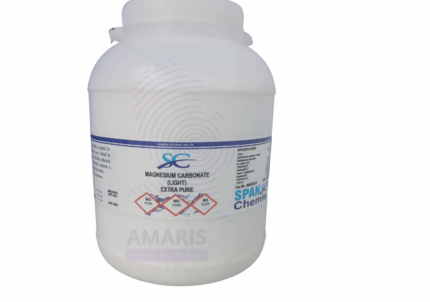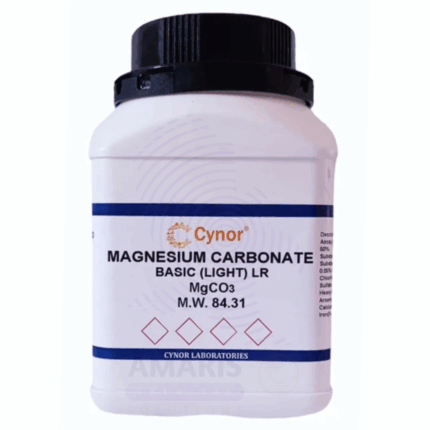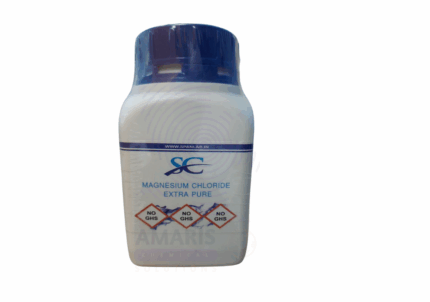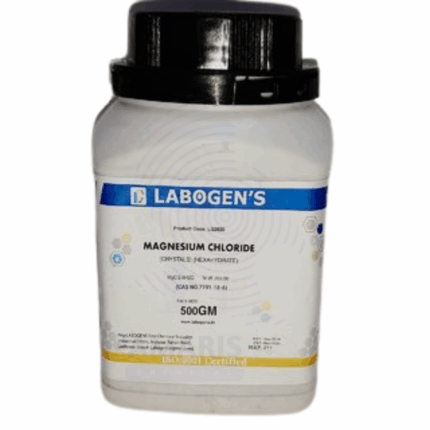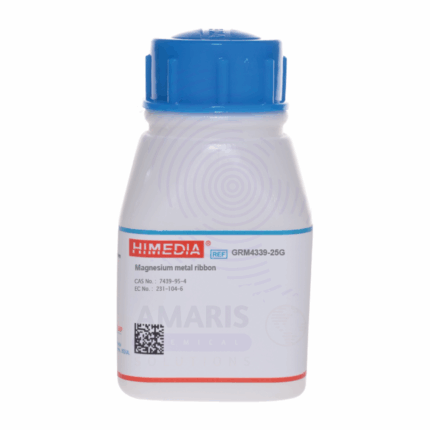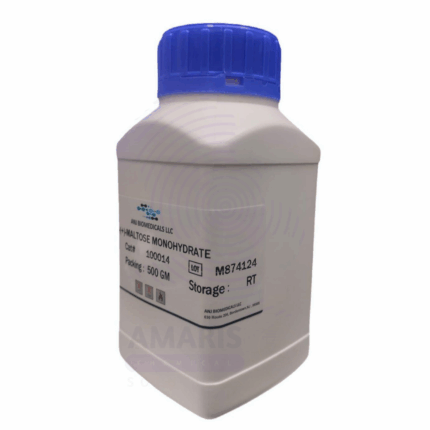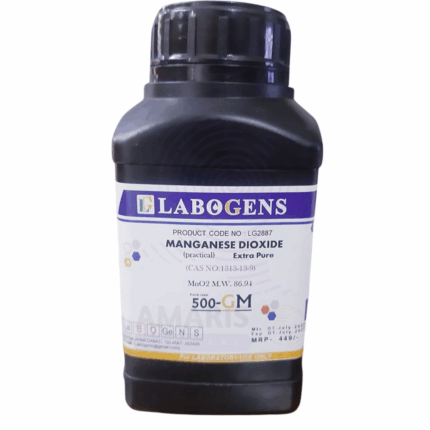Sodium Diphenylamin Sulphonate Extra Pure
$ 17.21
Sodium Diphenylamin Sulphonate Extra Pure is a white to pale yellow crystalline powder used primarily as an analytical reagent and corrosion inhibitor. It functions as a redox indicator and stabilizer in chemical reactions, making it valuable for laboratory and industrial applications. It also serves as an intermediate in dye and pharmaceutical synthesis. Its Extra Pure grade ensures minimal impurities, suitable for sensitive chemical processes. Proper storage and handling maintain its stability and effectiveness.
Sodium Diphenylamin Sulphonate Extra Pure
PRIMARY USES
- Analytical Reagent & Laboratory Applications:
Used as an indicator and reagent in redox titrations
• Employed in detection and quantitative analysis of nitrites and nitrates
• Acts as a stabilizer and corrosion inhibitor in specific chemical processes - Pharmaceutical & Chemical Manufacturing:
Utilized in synthesis of dyes and pharmaceuticals
• Functions as an intermediate in organic synthesis involving sulphonate derivatives - Corrosion Inhibition:
Applied as an inhibitor to protect metals, especially in acidic environments
• Used in industrial water treatment to prevent rust and scale formation
SECONDARY USES
- Textile & Dye Industry:
Used as an intermediate in dye manufacture and textile processing - Research & Development:
Employed in experimental and research chemistry for specialized analytical techniques
1. Basic Identification Attributes
- Chemical Name: Sodium Diphenylamin Sulphonate
• CAS Number: 2832-00-6
• HS Code: 2921.42.00
• Molecular Formula: C₁₂H₁₀NNaO₃S
• Synonyms:
- Sodium diphenylamine sulfonate
- Diphenylamine sulphonate sodium salt
2. Physical & Chemical Properties
Physical State: Solid (powder or crystalline)
• Color & Odor: White to pale yellow, odorless or faint aromatic odor
• Melting Point: Decomposes before melting (~250 °C)
• Density/Specific Gravity: ~1.3 g/cm³
• Solubility:
- Soluble in water
- Insoluble in organic solvents such as ethanol and ether
• pH Level: Mildly alkaline in aqueous solution
• Vapor Pressure & Volatility: Negligible
• Flash Point: Not applicable (non-flammable)
3. Safety & Hazard Attributes
Hazard Class (GHS Classification):
- May cause skin and eye irritation
• NFPA Ratings: - Health: 1
- Flammability: 0
- Reactivity: 0
• Exposure Limits: - No specific OSHA PEL or ACGIH TLV established
• Reactivity: - Stable under recommended storage conditions
- Avoid contact with strong oxidizers
4. Storage & Handling Attributes
Storage Conditions:
- Store in a cool, dry, and well-ventilated area
- Protect from moisture and direct sunlight
• Incompatible Materials: - Strong oxidizing agents
• Container Type: - Plastic or glass containers, sealed to prevent moisture ingress
• Shelf Life & Expiration Date: - Stable for several years if stored properly
• Special Handling Requirements: - Avoid dust formation
- Use protective equipment during handling
5. Regulatory & Compliance Attributes
Regulatory Status:
- Approved for laboratory and industrial use
- Not typically used in food or pharmaceutical applications
• Transportation Restrictions: - Not classified as hazardous for transport
• Waste Disposal Method: - Dispose according to local environmental regulations
- Non-hazardous waste classification
6. Environmental & Health Impact
Ecotoxicity:
- Data limited; presumed low environmental toxicity
• Persistence in Environment: - Expected to degrade slowly due to sulphonate group
• Carcinogenicity/Mutagenicity: - Not classified as carcinogenic or mutagenic
• Biodegradability: - Low biodegradability; inorganic-organic compound
SAFETY PRECAUTIONS
Personal Protective Equipment (PPE):
• Wear chemical-resistant gloves
• Use safety goggles or face shield
• Wear protective clothing to avoid skin contact
• Use dust mask or respirator if handling powder in bulk
Handling:
• Avoid inhalation of dust
• Handle in well-ventilated area
• Wash hands thoroughly after handling
Storage:
• Store in tightly sealed containers
• Keep away from moisture, strong oxidizers, and sunlight
FIRST AID MEASURES
Inhalation:
• Move to fresh air immediately
• Seek medical attention if breathing difficulties occur
Skin Contact:
• Wash skin with plenty of water and soap
• Remove contaminated clothing
• Seek medical attention if irritation develops
Eye Contact:
• Rinse eyes with plenty of water for at least 15 minutes
• Seek medical advice if irritation persists
Ingestion:
• Rinse mouth with water
• Do not induce vomiting
• Seek medical advice if symptoms develop
FIRE FIGHTING MEASURES
Flammability:
• Non-flammable solid
Extinguishing Media:
• Use water spray, foam, dry chemical, or CO₂
Hazardous Combustion Products:
• May produce toxic fumes containing nitrogen oxides and sulfur oxides on decomposition
Firefighter Protection:
• Use self-contained breathing apparatus (SCBA) and full protective gear


 Preservatives(food)
Preservatives(food) Flavor Enhancers
Flavor Enhancers Acidulants
Acidulants Sweeteners
Sweeteners Antioxidants
Antioxidants Colorants(food)
Colorants(food) Nutraceutical Ingredients (food)
Nutraceutical Ingredients (food) Nutrient Supplements
Nutrient Supplements Emulsifiers
Emulsifiers
 Collectors
Collectors Dust Suppressants
Dust Suppressants Explosives and Blasting Agents
Explosives and Blasting Agents Flocculants and Coagulants
Flocculants and Coagulants Frothers
Frothers Leaching Agents
Leaching Agents pH Modifiers
pH Modifiers Precious Metal Extraction Agents
Precious Metal Extraction Agents
 Antioxidants(plastic)
Antioxidants(plastic) Colorants (Pigments, Dyes)
Colorants (Pigments, Dyes) Fillers and Reinforcements
Fillers and Reinforcements Flame Retardants
Flame Retardants Monomers
Monomers Plasticizers
Plasticizers Polymerization Initiators
Polymerization Initiators Stabilizers (UV, Heat)
Stabilizers (UV, Heat)
 Antifoaming Agents
Antifoaming Agents Chelating Agents
Chelating Agents Coagulants and Flocculants
Coagulants and Flocculants Corrosion Inhibitors
Corrosion Inhibitors Disinfectants and Biocides
Disinfectants and Biocides Oxidizing Agents
Oxidizing Agents pH Adjusters
pH Adjusters Scale Inhibitors( water)
Scale Inhibitors( water)
 Antioxidants(cosmetic)
Antioxidants(cosmetic) Emollients
Emollients Fragrances and Essential Oils
Fragrances and Essential Oils Humectants
Humectants Preservatives
Preservatives Surfactants(cosmetic)
Surfactants(cosmetic) Thickeners
Thickeners UV Filters
UV Filters
 Fertilizers
Fertilizers Soil Conditioners
Soil Conditioners Plant Growth Regulators
Plant Growth Regulators Animal Feed Additives
Animal Feed Additives Biostimulants
Biostimulants Pesticides (Herbicides, Insecticides, Fungicides)
Pesticides (Herbicides, Insecticides, Fungicides)
 Active Pharmaceutical Ingredients (APIs)
Active Pharmaceutical Ingredients (APIs) Excipients
Excipients Solvents(pharmaceutical)
Solvents(pharmaceutical) Antibiotics
Antibiotics Antiseptics and Disinfectants
Antiseptics and Disinfectants Vaccine Adjuvants
Vaccine Adjuvants Nutraceutical Ingredients (pharmaceutical)
Nutraceutical Ingredients (pharmaceutical) Analgesics & Antipyretics
Analgesics & Antipyretics
 Analytical Reagents
Analytical Reagents Solvents(lab)
Solvents(lab) Chromatography Chemicals
Chromatography Chemicals Spectroscopy Reagents
Spectroscopy Reagents microbiology-and-cell-culture-reagents
microbiology-and-cell-culture-reagents Molecular Biology Reagents
Molecular Biology Reagents Biochemical Reagents
Biochemical Reagents Inorganic and Organic Standards
Inorganic and Organic Standards Laboratory Safety Chemicals
Laboratory Safety Chemicals Specialty Laboratory Chemicals(Special Laboratory Equipment)
Specialty Laboratory Chemicals(Special Laboratory Equipment)
 Demulsifiers
Demulsifiers Hydraulic Fracturing Fluids
Hydraulic Fracturing Fluids Scale Inhibitors(oil)
Scale Inhibitors(oil) Surfactants(oil)
Surfactants(oil) Drilling Fluids
Drilling Fluids
 Dyes and Pigments
Dyes and Pigments Bleaching Agents
Bleaching Agents Softening Agents
Softening Agents Finishing Agents
Finishing Agents Antistatic Agents
Antistatic Agents
 Admixtures
Admixtures Waterproofing Agents
Waterproofing Agents Sealants and Adhesives
Sealants and Adhesives Curing Compounds
Curing Compounds Concrete Repair Chemicals
Concrete Repair Chemicals Anti-Corrosion Coatings
Anti-Corrosion Coatings
 Surfactants(cleaning)
Surfactants(cleaning) Builders
Builders Enzymes
Enzymes Solvents (Cleaning)
Solvents (Cleaning) Fragrances
Fragrances
 Electronic Chemicals
Electronic Chemicals Catalysts
Catalysts Lubricants
Lubricants Photographic Chemicals
Photographic Chemicals Refrigerants
Refrigerants Automotive chemicals
Automotive chemicals Pyrotechnic Chemicals
Pyrotechnic Chemicals
 Biodegradable Surfactants
Biodegradable Surfactants Bio-based Solvents
Bio-based Solvents Renewable Polymers
Renewable Polymers Carbon Capture Chemicals
Carbon Capture Chemicals Wastewater Treatment Chemicals
Wastewater Treatment Chemicals
 Pigments
Pigments Solvents(paint)
Solvents(paint) Specialty Coatings
Specialty Coatings Binders/Resins
Binders/Resins Additives
Additives Driers
Driers Anti-Corrosion Agents
Anti-Corrosion Agents Functional Coatings
Functional Coatings Application-Specific Coatings
Application-Specific Coatings
 Leavening Agents
Leavening Agents Dough Conditioners
Dough Conditioners Flour Treatments
Flour Treatments Fat Replacers
Fat Replacers Decoratives
Decoratives Preservatives(baking)
Preservatives(baking)
 Plasticizers & Softeners
Plasticizers & Softeners Reinforcing Agents
Reinforcing Agents Adhesion Promoters
Adhesion Promoters Vulcanizing Agents
Vulcanizing Agents Antidegradants
Antidegradants Blowing Agents
Blowing Agents Fillers & Extenders
Fillers & Extenders Accelerators & Retarders
Accelerators & Retarders